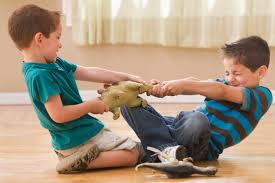Teaching Conflict Resolution To Toddlers

Conflict resolution is an essential life skill that even toddlers can begin to learn and practice. As toddlers grow in the environment around them, they inevitably encounter situations where conflicts arise, whether it is sharing of toys with siblings, taking turns with friends, or expressing frustration when things don’t go their way. By teaching conflict resolution to toddlers at the earlier on, parents and caregivers can help them develop the tools they need to manage conflicts positively and build healthy relationships with others.
What is Conflict Resolution?
Conflict resolution involves the process of addressing and resolving disagreements or conflicts in a peaceful and constructive manner. It requires effective communication, empathy, problem solving skills, and the ability to manage emotions. For toddlers, who are still developing these skills, teaching conflict resolution involves simplifying these concepts and providing age appropriate strategies for managing conflicts.
Key Principles of Teaching Conflict Resolution to Toddlers
- Modeling Positive Behavior: Children learn by example, so it is essential for parents and caregivers to model positive conflict resolution skills in their own interactions. This includes demonstrating calmness, empathy, active listening, and problem solving techniques when resolving conflicts with others.
- Encouraging Effective Communication: Toddlers may not yet have the verbal skills to express themselves fully, but caregivers can encourage communication by teaching simple phrases or gestures to express feelings such as “I’m mad” or “I need a turn.” Encouraging toddlers to use their words helps them learn to express their needs and feelings in non-confrontational ways.
- Teaching Empathy: Empathy is the ability to understand and share the feelings of others, and it is an essential component of conflict resolution. Caregivers can teach toddlers empathy by helping them recognize and validate the feelings of others, such as saying, “I can see you’re upset because your friend took your toy.”
- Promoting Problem Solving Skills: Conflict resolution involves finding mutually beneficial solutions to disagreements. Caregivers can help toddlers develop problem solving skills by guiding them through simple problem solving scenarios, such as brainstorming ideas for sharing a toy or taking turns on a swing.
- Encouraging Positive Reinforcement: Positive reinforcement, such as praise and encouragement, is a powerful tool for reinforcing desired behaviors. When toddlers successfully resolve conflicts using positive strategies, caregivers should praise their efforts and highlight the positive outcomes of their actions.
Strategies for Teaching Conflict Resolution Skills to Toddlers
- Role Playing Scenarios: Role playing is an effective way to teach toddlers how to handle conflicts. Caregivers can create scenarios or use toys to play a role in common conflict situations, such as sharing toys or taking turns, and guide toddlers through the steps of resolving the conflict peacefully.
- Using Social Stories: Social stories are short narratives that illustrate social situations and appropriate behaviors. Caregivers can create or find social stories that depict conflict resolution scenarios and read them with toddlers to help them understand how to take care of similar situations in real life.
- Implementing Time In Instead of Time Out: Time in involves taking a break from the situation to calm down and reflect on feelings and actions together. Caregivers can use time in as an opportunity to discuss what happened, how it made each person feel, and brainstorm solutions together.
- Teaching Relaxation Techniques: Teaching toddlers simple relaxation techniques, such as deep breathing or counting to ten, can help them manage strong emotions and calm down during conflicts. Caregivers can practice these techniques together with toddlers during calm moments and encourage their use during conflicts.
- Providing Positive Reinforcement: When toddlers successfully resolve conflicts using positive strategies, caregivers should praise their efforts and provide positive reinforcement. This could include verbal praise, hugs, high fives, or special rewards to reinforce the importance of using positive conflict resolution skills.
- Encouraging Perspective Taking: Perspective taking involves considering the thoughts and feelings of others in a conflict situation. Caregivers can encourage toddlers to consider the perspective of the other person involved in the conflict by asking questions such as, “How do you think your friend feels when you take their toy?”.
SEE ALSO:
Why Modeling Good Behavior As A Parent Matters
Effective Strategies For Handling Aggressive Behavior In Toddlers
Teaching Empathy and Respect to Toddlers
Effective Positive Discipline Strategies For Toddlers
Takeaway
Teaching conflict resolution skills to toddlers is a valuable investment in their social and emotional development. By providing them with the tools and strategies they need to manage conflicts positively, caregivers can help toddlers build healthy relationships, develop empathy and communication skills, and take care of the challenges of social interactions with confidence. With patience, consistency, and a supportive environment, toddlers can learn to resolve conflicts peacefully and build a foundation for healthy conflict resolution throughout their lives.
Leave a Reply